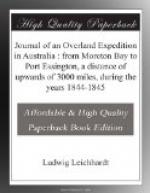Whilst my companions returned to Brown’s Lagoons, Mr. Calvert and Brown remained with me to examine the country. The creek which I followed down, almost entirely disappeared; but, five miles farther on, its channel was again observed, as deep as before, and was joined by several water-courses from the Christmas Ranges. The principal channel of the creek was lined with a species of Melaleuca, with slightly foliacious bark. Several species of sedges, and nutritious grasses, grew round the holes in which the water was constant. At about fifteen miles from the camp, the creek was joined by that which I had followed for some distance on the 15th December, and, about three miles farther down, it receives another considerable tributary; and, at their junction, it is a fine sheet of water. Here the country begins to open, with large Box-flats extending on both sides. Two small creeks come in from the scrubby hills to the eastward, but, at a short distance beyond their junction, almost the whole channel disappears. Soon after, we came to another creek, to the left of the first; but it disappeared in the same manner as the other. We came upon several lagoons, and found some very fine grass: the scrub reappeared on the rising ground about six miles north from the large sheet of water. A little farther on, we came to ridges of basaltic formation, openly timbered with silver-leaved Ironbark, and richly covered with young grasses and herbs, identical with those of the Darling Downs. Water holes with fine water were found at the foot of the hills. Mimosa terminalis was frequent; numerous flights of partridge pigeons (Geophaps scripta) were also seen.
Dec. 24.—We returned towards the camp, but, through some inattention, kept too much to the eastward, and passed through a country of an extremely diversified character, and very different in appearance from that we had just left. Here we passed an extensive Myal forest, the finest I had seen, covering the hilly and undulating country, interspersed with groves of the native lemon tree; a few of which were still sufficiently in fruit to afford us some refreshment. Occasionally we met with long stretches of small dead trees, probably killed by bush fires, alternating with Bricklow thickets: and then again crossed small plains and patches of open forest ground, which much relieved the tediousness of the ride through thick scrubs, which we had frequently to penetrate with both hands occupied in protecting the face from the branches. We also crossed chains of water-holes surrounded by a coarse stargrass; these now changed into creeks with deep and irregular beds, lined with Melaleucas, and now again dwindled into shallow channels, scarcely to be recognised amidst the surrounding scrub. A week before, these holes were hopelessly dry; but a recent thunder-storm had filled them; and had also made the ground soft and heavy, and had called into life thousands of small frogs, which, by an incessant croaking, testified their satisfaction at the agreeable change.




